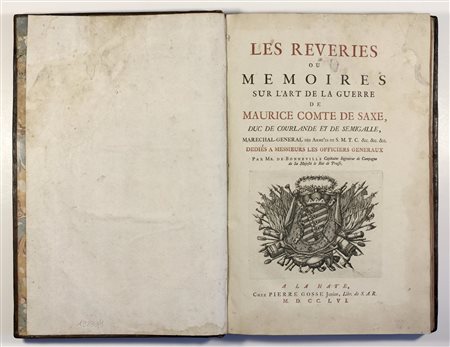 Itineris Casa d'Aste - Via Tiziano Vecellio 34/D, 10126 Torino
Itineris Casa d'Aste - Via Tiziano Vecellio 34/D, 10126 Torino
DIPINTI E SCULTURE ANTICHI E DEL XIX SECOLO - LIBRI ANTICHI - STAMPE E DISEGNI Prima Sessione - Libri antichi, disegni e stampe
giovedì 18 giugno 2020 ore 15:00 (UTC +01:00)
Maurice Comte de De Saxe (1696 - 1750) Les Reveries ou Memoires sur l'Art de...
Maurice Comte de De Saxe (1696 - 1750)
Les Reveries ou Memoires sur l'Art de la Guerre. Dediés a Messieurs les Officiers Generaux par M. de Bonneville, Capitaine Ingenieur de Campagne de sa Majesté le Roi de Prusse.
The Hague, Pierre Gosse, Junior, 1756
In-folio (mm 370x235). Pagine (12), 228, (4). Con 40 tavole fuori testo piω volte ripiegate incise in rame. Frontespizio in rosso e nero con grande stemma nobiliare calcografico; testatine, capilettera e finalini incisi in rame. Bell'esemplare in carta grave ad ampi margini. Legatura coeva in tutta pelle, con titoli su tassello applicato al dorso a 6 nervi, fregi floreali ai comparti; tagli spruzzati.
Condition: Prime due carte restaurate e gore d'umido nel margine superiore destro delle pagine.
Rara edizione originale in-folio, da non confondersi con la meno importante edizione coeva in-8° in 2 volumi; manca a Graesse.
Folio (370x235 mm). Contemporary sprinkled calf, raised bands, gilt sun-in-splendour tools within palm branches to the compartments, red morocco label, red sprinkled edges. Lightly browned and damp staining on upper right margin, but overall a very handsome copy. Fine large engraved trophy vignette to the title page, similar head and tailpieces throughout, 40 engraved plates, 18 of them double-page, 4 double-page, folding. Ancient ex-libris with coat of arms. First edition, surprisingly uncommon, three copies only on COPAC. "De Saxe's work is a comprehensive treatise on war. He puts forward his ideal military model, his "legion", and taking issue with the views and practices of his age, he advances many original ideas. However, rather than discussing his military doctrines, the aim of this book is to elucidate the intellectual premises that dominated his mind: he saw a need to subject military affairs to reasoned criticism and intellectual treatment, and the ensuing military doctrines were perceived as forming a definitive system" (Gat, The Origins of Military Thought, p.33). Carlyle described it as a "strange military farrago, dictated, as I should think, under opium", which is perhaps not entirely as unfair as it may seem, a note on the original MS at Dresden reads, "I composed this work in Thirteen nights: I was ill, therefore, it may perhaps bear marks of the fever which I had. This ought to excuse the regularity of the arrangement, as also the elegance of style. I wrote in a military manner and to kill time." Whatever the oddness of its style the Reveries was immensely influential, reprinted three times in 1757 and again in 1761 and 1763, German editions of 1757 and 1767 and English of 1757, 1759 and 1776.







